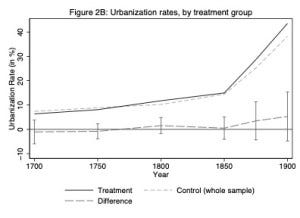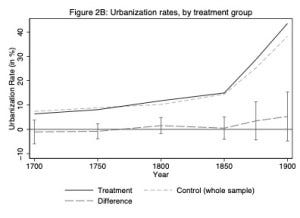Embracing Historical Contingency In Historical Political Economy
By Davide Cantoni and Noam Yuchtman
Natural experiments in history have allowed economic historians, development economists, and economists more generally to pose big questions while still attaining the identification of causal effects that is emphasized in modern empirical microeconomics. Of particular interest has been a large body of work documenting the long-run impacts of historical events – shaping contemporary economic outcomes, political outcomes, and culture (e.g., Acemoglu et al., 2001; Dell, 2010; Nunn and Wantchekon 2011; Alesina et al., 2013; Guiso et al., 2016).
This body of work naturally raises questions regarding the mechanisms underlying persistent effects of historical treatments. We argue that a promising avenue to identify mechanisms lies in the embrace of historical contingency. Rather than viewing a historical treatment as mechanically and unchangingly generating a sequence of outcomes over time, this treatment should interact in a predictable fashion with the arrival of time-varying shocks. Economists can apply both theory and history to generate hypotheses and test for these predicted heterogeneous treatment effects.
Consider as an example the natural experiment of Napoleon’s invasion of Germany in the early 19th century. As Acemoglu et al. (2011) show, the effect of this invasion was to increase economic development in the late 19th century.

How can economic theory and an appreciation of historical contingency help us understand this dynamic pattern of causal effects? Suppose one believes that the modernization of institutions – the abolition of the ancien regime – played a role in the long-run divergence in economic outcomes observed. One first can use theory to generate a set of predictions: the effects of institutional change should have been greater in times when the economic returns to investment and innovation were also greater. One can then use an understanding of the historical events to predict that the arrival of industrial technologies to continental Europe in the second half of the 19th century should have sharply increased the economic returns to investment and innovation.
Theory and historical contingency together suggest a coherent set of testable predictions arising from the proposed mechanism of modernized institutions: one should see a null effect of Napoleon’s invasion in the early 19th century and a substantial effect arising in the late 19th century. This is precisely what is observed, thus providing strong, theoretically motivated support for the proposed mechanism.
This suggests an analogy with contemporary RCT’s: much as Heckman (2005) and Deaton (2010) argue for the application of theory to interpret estimates from contemporary RCTs, historical natural experiments are best understood through a theoretical lens. Historical experiments present an additional dimension of variation: the arrival of time-varying shocks that make treatment effects not only local, but also historically contingent.
One might think that identifying sources of historical contingency will limit the extent to which estimates from a specific historical setting can be applied to more general economics research questions. In fact, we argue the opposite. Good general interest economics requires an understanding how a treatment effect arose, and thus to what contexts it generalizes. This is precisely what an appreciation of historical contingency provides. Moreover, tests of theory arising from an appreciation of historical contingency provide evidence on economic mechanisms that may be far more general than the reduced form effect of a specific historical treatment.
We believe there is no tension between being a good historian and being a good economist. Good history, like good theory, produces better applied economics.
References
Acemoglu, D., Johnson, S., and Robinson, J. A. (2001). The Colonial Origins of Comparative Development: An Empirical Investigation. American Economic Review, 91(5): 1369–1401.
Acemoglu, D., Cantoni, D., Johnson, S., and Robinson, J. A. (2011). The Consequences of Radical Reform: The French Revolution. American Economic Review, 101(7): 3286–3307.
Alesina, A., Giuliano, P., and Nunn, N. (2013). On the Origins of Gender Roles: Women and the Plough. Quarterly Journal of Economics, 128(2): 469–530.
Deaton, A. (2010). Instruments, Randomization, and Learning about Development. Journal of Economic Literature. 48(2): 424–455.
Dell, M. (2010). The Persistent Effects of Peru’s Mining Mita. Econometrica, 78(6): 1863–1903.
Guiso, L., Sapienza, P., and Zingales, L. (2016). Long-Term Persistence. Journal of the European Economic Association, 14(6): 1401–1436.
Heckman, J.J. (2005). The Scientific Model of Causality. Sociological Methodology. 35(1): 1–97.
Nunn, N. and Wantchekon, L. (2011). The Slave Trade and the Origins of Mistrust in Africa. American Economic Review, 101(7): 3221–3252.



